
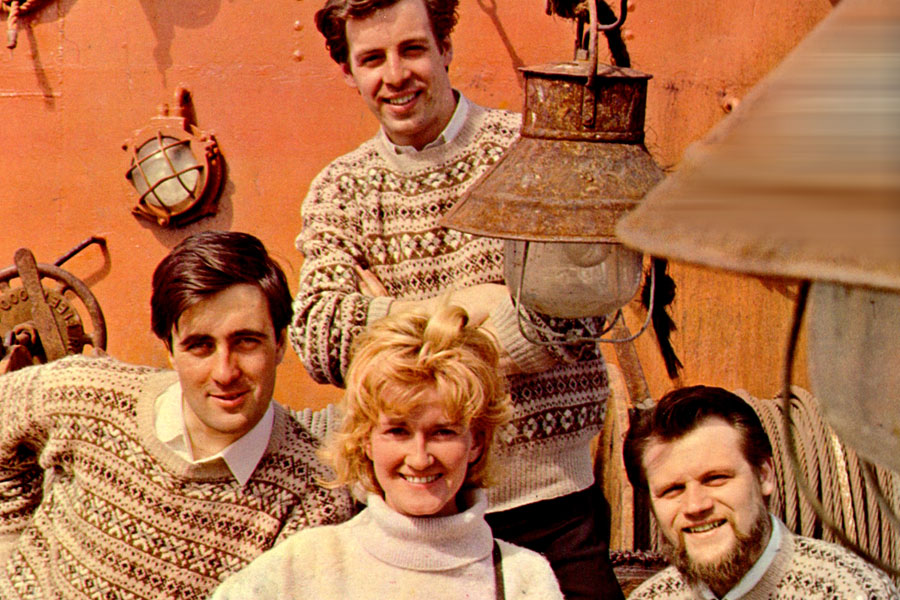
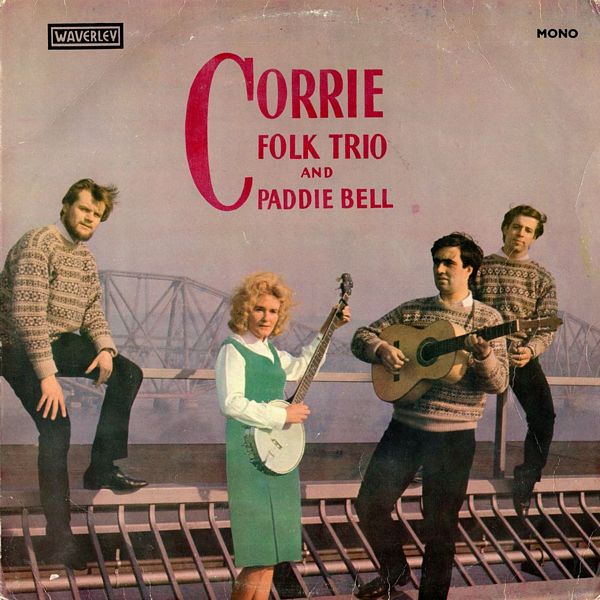 |
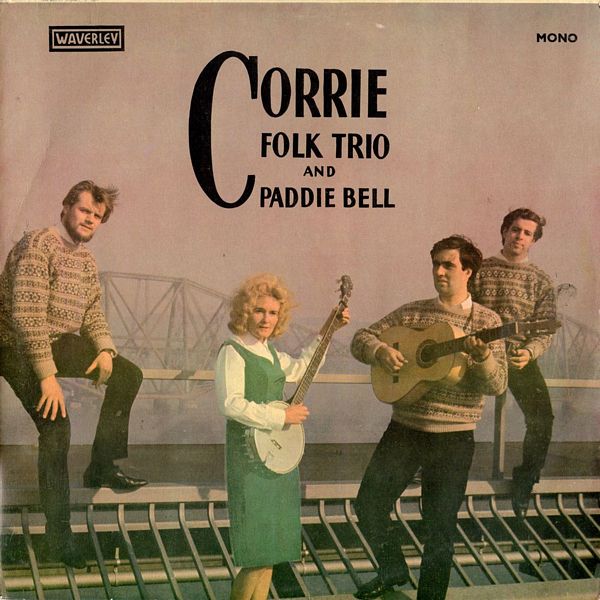
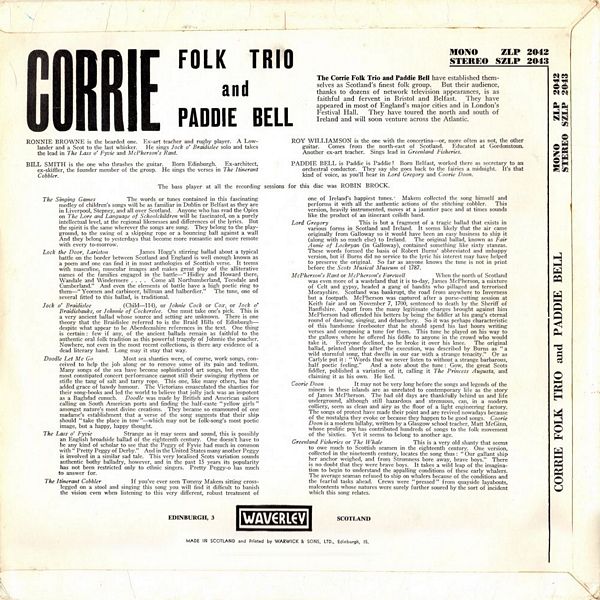
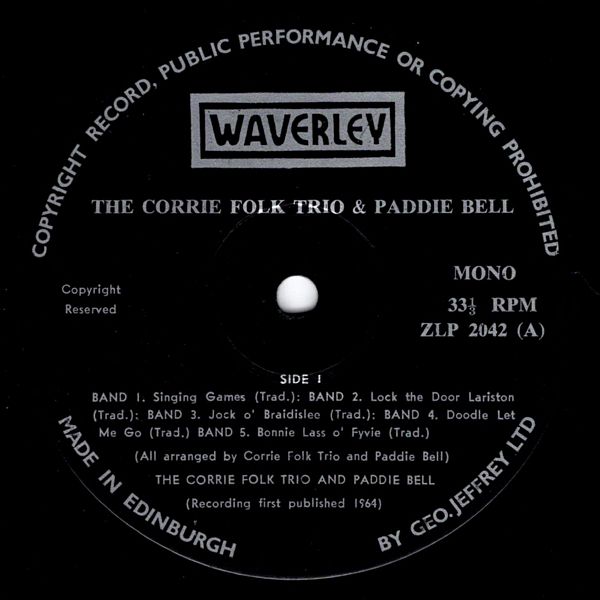
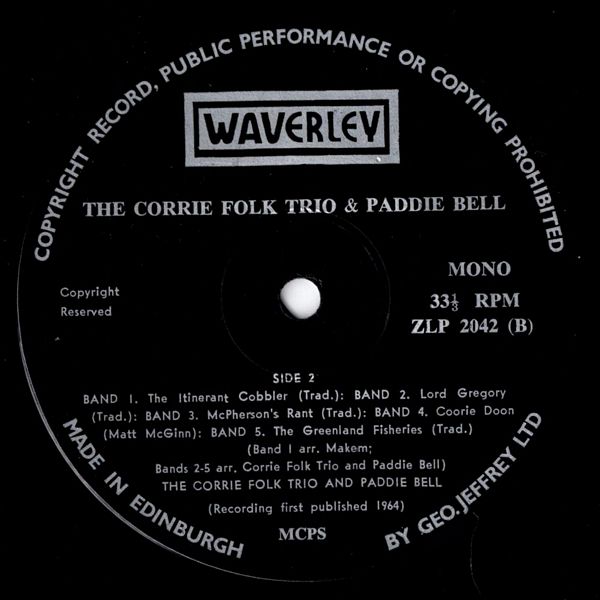 |
Sleeve Notes
The Corrie Folk Trio and Paddie Bell have established themselves as Scotland's finest folk group. But their audience, thanks to dozens of network television appearances, is as faithful and fervent in Bristol and Belfast. They have appeared in most of England's major cities and in London's Festival Hall. They have toured the north and south of Ireland and will soon venture across the Atlantic.
RONNIE BROWNE is the bearded one. Ex-art teacher and rugby player. A Low-lander and a Scot to the last whisker. He sings Jock o' Braidislee solo and takes the lead in The Lass o' Fyvie and McPherson's Rant.
BILL SMITH is the one who thrashes the guitar. Born Edinburgh. Ex-architect, ex-skiffler, the founder member of the group. He sings the verses in The Itinerant Cobbler.
ROY WILLIAMSON is the one with the concertina — or, more often as not, the other guitar. Comes from the north-east of Scotland. Educated at Gordonstoun. Another ex-art teacher. Sings lead in Greenland Fisheries.
PADDIE BELL is Paddie is Paddie! Born Belfast, worked there as secretary to an orchestral conductor. They say she goes back to the fairies a midnight. It's that kind of voice, as you'll hear in Lord Gregory and Coorie Doon.
The bass player at all the recording sessions for this disc was ROBIN BROCK.
The Singing Games The words or tunes contained in this fascinating medley of children's songs will be as familiar in Dublin or Belfast as they are in Liverpool, Stepney, and all over Scotland. Anyone who has read the Opies on The Lore and Language of Schoolchildren will be fascinated, on a purely intellectual level, at the regional likenesses and differences of the lyrics. But the spirit is the same wherever the songs are sung. They belong to the playground, to the swing of a skipping rope or a bouncing ball against a wall And they belong to yesterdays that become more romantic and more remote with every tomorrow.
Lock the Door, Lariston James Hogg's stirring ballad about a typical battle on the border between Scotland and England is well enough known as a poem and one can find it in most anthologies of Scottish verse. It teems with masculine, muscular images and makes great play of the alliterative names of the families engaged in the battle — " Hidley and Howard there, Wandale and Windermere … Come all Northumberland, Teesdale and Cumberland." And even the elements of battle have a high poetic ring to them — " Yeomen and carbineer, billman and halberdier." The tune, one of several fitted to this ballad, is traditional.
Jock o' Braidislee (Child — 114), or Johnie Cock or Cox, or Jock o' Braidisbauks, or Johnnie of Cockerslee. One must take one's pick. This is a very ancient ballad whose source and setting are unknown. There is one theory that the Braidislee referred to is the Braid Hills of Edinburgh — despite what appear to be Aberdeenshire references in the text. One thing is certain: few if any, of the ancient ballads remain as faithful to the authentic oral folk tradition as this powerful tragedy of Johnnie the poacher. Nowhere, not even in the most recent collections, is there any evidence of a dead literary hand. Long may it stay that way.
Doodle Let Me Go Most sea shanties were, of course, work songs, conceived to help the job along or to remove some of its pain and tedium. Many songs of the sea have become sophisticated art songs, but even the most constipated concert performance cannot still their swinging rhythms or stifle the tang of salt and tarry rope. This one, like many others, has the added grace of bawdy humour. The Victorians emasculated the shanties for their songbooks and led the world to believe that jolly jack was an impotent as a Baghdad eunuch. Doodle was made by British and American sailors calling on South American ports and finding the half-caste " yellow girls " amongst nature's most divine creations. They became so enamoured of one madame's establishment that a verse of the song suggests that their ship should "take the place in tow" — which may not be folksong's most poetic image, but a happy, happy thought.
The Lass o' Fyvie Strange as it may seem and sound, this is possibly an English broadside ballad of the eighteenth century. One doesn't have to be any kind of scholar to see that the Peggy of Fyvie had much in common with " Pretty Peggy of Derby." And in the United States many another Peggy is involved in a similar sad tale. This very localised Scots variation sounds authentic bothy balladry, however, and in the past 15 years its popularity has not been restricted only to ethnic singers. Pretty Peggy-o has much to answer for.
The Itinerant Cobbler If you've ever seen Tommy Makem sitting cross-legged on a stool and singing this song you will find it difficult to banish the vision even when listening to this very different, robust treatment of one of Ireland's happiest tunes.' Makem collected the song himself and performs it with all the authentic actions of the stitching cobbler. This version, heavily instrumented, moves at a jauntier pace and at times sounds like the product of an itinerant ceilidh band.
Lord Gregory This is but a fragment of a tragic ballad that exists in various forms in Scotland and Ireland. It seems likely that the air came originally from Galloway so it would have been an easy business to ship it (along with so much else) to Ireland. The original ballad, known as Fair Annie of Lochryan (in Galloway), contained something like sixty stanzas. These words formed the basis of Robert Burns' abbreviated and unhappy version, but if Burns did no service to the lyric his interest may have helped to preserve the original. So far as anyone knows the tune is not in print before the Scots Musical Museum of 1787.
McPherson's Rant or McPherson's Farewell When the north of Scotland was even more of a wasteland that it is today, James McPherson, a mixture of Celt and gypsy, headed a gang of bandits who pillaged and terrorised Morayshire. Scotland was bankrupt, the road from anywhere to Inverness but a footpath. McPherson was captured after a purse-cutting session at Keith fair and on November 7, 1700, sentenced to death by the Sheriff of Banffshire. Apart from the many legitimate charges brought against him McPherson had offended his betters by being the fiddler at his gang's eternal round of dancing, singing, and debauchery. So it was perhaps characteristic of this handsome freebooter that he should spend his last hours writing verses and composing a tune for them. This tune he played on his way to the gallows where he offered his fiddle to anyone in the crowd who would take it. Everyone declined, so he broke it over his knee. The original ballad, printed shortly after the execution, was described by Burns as " a wild stormful song, that dwells in our ear with a strange tenacity." Or as Carlyle put it: " Words that we never listen to without a strange barbarous, half poetic feeling." And a note about the tune: Gow, the great Scots fiddler, published a variation of it, calling it The Princess Augusta, and claiming it as his own. He lied.
Coorie Doon It may not be very long before the songs and legends of the miners in these islands are as unrelated to contemporary life as the story of James McPherson. The bad old days are thankfully behind us and life underground, although still hazardous and strenuous, can, in a modern colliery, seem as clean and airy as the floor of a light engineering factory. The songs of protest have made their point and are revived nowadays because of the nostalgia they evoke or because they happen to be good songs. Coorie Doon is a modem lullaby, written by a Glasgow school teacher, Matt McGinn, whose prolific pen has contributed hundreds of songs to the folk movement of the 'sixties. Yet it seems to belong to another age.
Greenland Fisheries or The Whale This is a very old shanty that seems to owe much to Scottish seamen in the eighteenth century. One version, collected in the nineteenth century, locates the song thus: " Our gallant ship her anchor weighed, and from Stromness bore away, brave boys." There is no doubt that they were brave boys. It takes a wild leap of the imagination to begin to understand the appalling conditions of these early whalers. The average seaman refused to ship on whalers because of the conditions and the fearful tasks ahead. Crews were "pressed" from quayside layabouts, malcontents whose natures were surely further soured by the sort of incident which this song relates.